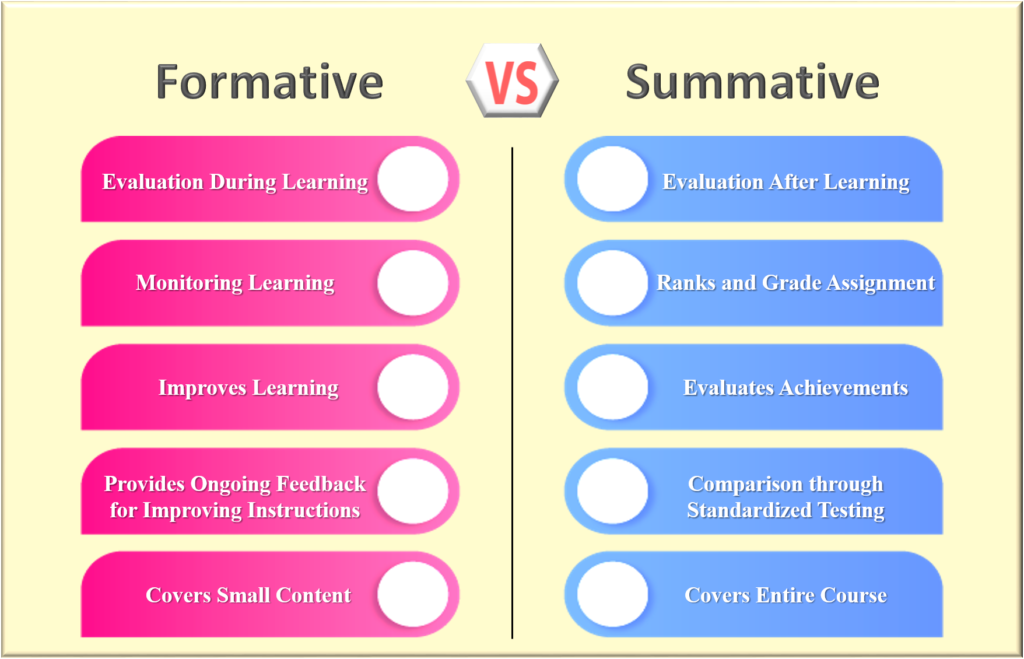What assessment ideas have peeked your interest?
Throughout my university career, I have been exposed to numerous types of assessments and very interesting activities. I want to first start by explaining my experiences with formative and summative assessment. I have always found formative assessment a good method in allowing students to adjust their learning and improve throughout classes. I found it extremely useful to be monitored and provided ongoing feedback in all my classes. This allowed me to identify my strengths and provide me insight into what I needed to improve on. Some of these formative assessments would include weekly quizzes, iClicker questions, In-class discussions, and self-evaluation. All mentioned provided me a valuable opportunity to measure my performance in class. I especially found class discussion extremely useful to reinforce concepts that have been covered. Similarly, with dialogue, meanings can be explored, and the teacher can shift from an evaluative role (did the student answer correctly or not?) to an interpretive role (what can I learn about the student’s thinking by attending carefully to what she just said?) (Black & Wiliam, 2014)
I often found classes that relied heavily on summative assessment to be quite difficult. There have been numerous classes I’ve taken where a large portion of the grade consisted of a final exam, for example, STAT 260 final exam worth 51%. I found this difficult to understand, I feel that as students our knowledge of the material shouldn’t all count towards one examination. By breaking up the learning into manageable blocks and taking a formative approach for assessment, I believe this is a much more efficient way in students retaining information. I relate summative assessment to the end output of a class which doesn’t take into consideration cognitive ability during the class. I much prefer on being assessed throughout the entirety of the class, rather than having to stress about retaining a large amount of information at completion.

One type of assessment that I find interesting is norm-referenced assessment, and comparing students based on a scale. I often found this method quite flawed. To illustrate, an example of this would be a provincial exam that slots each student in a percentile. I find this interesting because it goes against assessing the individual student, but rather placing the student in a category. I can understand the desire to be able to determine performance on a large scale, however fundamentally this method is comparing students based on their assessments scores. Additionally, these test scores are viewed by governing bodies that provide resources and funding to school districts. I feel that it is unfair to aggregate student scores and rank them based on their peers, especially when these scores are in the public eye and subject to judgement by governing bodies. With that said, I don’t believe this is an effective method of assessment as it doesn’t focus on the growth of the learner.
Another assessment method I found interesting while researching is Ispative assessment. This method is self-referenced and consists of the learner assessing their work based on previous work they have completed. I feel that this is an excellent method of assessment, as it eliminates the comparisons of learners and focuses on individual students and their effort. Comparably, even a student who has a so-called “low” achievement level, may actually be the superior learner if he shows greater individual improvement over his past efforts. This may reflect their having received special help in the interim (e.g. from a tutor), or from their having shown greater effort over time (Armstrong, 2020). This method also provides a sense of progress and reaching milestones in ones learning ability. I also think this method could eliminate the comparison of grades which usually leads to negative consequences on oneself.
I found the discussed assessment tools very interesting and their application in the learning environment. I do appreciate how each assessment tool provides a different perspective on the desired outcomes, which I also find very intriguing. Based on the research I had done; I feel that the purpose of an assessment tool is to provide students a baseline on their learning habits and trends. I find categorizing or aggregating grades of learners to fulfill an administrative task non-beneficial and doesn’t support the student in any way. With that said, I’ve definitely gained new insights into the evaluation and development of students.
References
Armstrong, T. (2020). 10 Things Educators Should Know About Ipsative Assessments. https://www.institute4learning.com/2020/03/05/10-things-educators-should-know-about-ipsative-assessments/
Black, P., & Wiliam , D. (2014). Assessment and the Design of Educational Materials. https://www.educationaldesigner.org/ed/volume2/issue7/article23/.
2021-06-13 at 8:53 pm
https://sarahyvetteblogedci337.opened.ca/2021/06/13/blog-5-examples-of-game-based-learning-in-the-1990s/
Sarah,
Very interesting perspective on Game Based Learning! I like how you mentioned that any topic can be turned into a learning game. All of the games you discussed sounds very fun while at the same time informative. The integration of Covid-19 protocols clearly show that anything can be turned into a game that is super beneficial.
I completely agree with your point on the importance of students utilizing technology in their learning. Coding being introduced in schools for children is a perfect example, which I am in full support of! Once again, a very insightful blog post. Thanks Sarah!